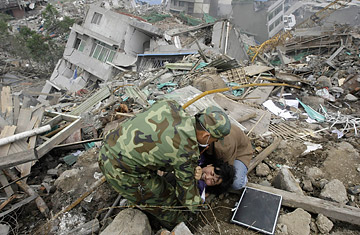
A woman cries after she finds out a survivor who has just been rescued from a collapsed building is not her husband, in Beichuan county, Sichuan Province, China.
Zhang Qi still had $50 in his wallet when he died. Besides that, not much is known about him. His body lies under a sheet on a sidewalk in Dujiangyan, a city of 600,000 that was badly damaged by the May 12 earthquake that devastated parts of Sichuan province and reverberated across China. Residents of the town step around Zhang's corpse, watching idly as a backhoe moves rubble from a collapsed apartment building across the street. At the other corner of the block paramilitary soldiers in green uniforms climb over another flattened building, removing debris and searching for survivors inside. Beside Zhang's body lies another. This one is claimed. Family members dressed in white, the color of mourning in China, burn offerings and load the body into a van.
But Zhang's family is nowhere to be found. Zhao Hongpin, a volunteer from the nearby provincial capital of Chengdu, is desperately trying to locate anyone who knew the dead man. He walks through the crowd gathered on the sidewalk, flashing identification cards from the deceased's wallet to anyone who will look at them. But none will claim him. "If I leave his wallet here, what do you think will happen?" says Zhao. "There are people from the local government around, but they're somewhere else right now. Everyone is overwhelmed."
Monday's catastrophic earthquake has produced a massive official response. But even the 100,000 soldiers and paramilitary troops who were in the region by Thursday or the legions of volunteers whose cars jam the roads to the disaster zone are not enough to cope with the scale of the destruction. The official death toll for Monday's 7.9 magnitude quake reached 19,509 Thursday, and the State Council said that it could reach 50,000, according to the state-run Xinhua News Service. Now several dams in the area are reported to have severe cracks, raising the threat that towns trying to dig out could be hit by floodwaters.
While authorities were able to respond quickly to Dujiangyan, damage to roads kept rescuers out of some towns in the mountains for days. Soldiers finally reached the epicenter of Wenchuan county Wednesday. The initial reports from Wenchuan county were that the damage was severe. In the town of Yingxiu, only 2,300 out of a population of 10,000 survived, the state-run Xinhua said. Helicopters that had been prevented from flying to the area because of heavy rains were finally able to deliver supplies. Premier Wen Jiabao, who flew in with the troops, told residents, "The central government has not forgotten about this place."
For some people in mountain villages cut off by the quake, waiting wasn't an option. Some hiked out on their own. The roads to Bu Xiaoyan's village of Gaochuan were blocked, so she left her husband, the principal of the local school, and set off across the mountains. "It took me seven hours to walk out," the 29-year-old mother said. Now she is hitchhiking through the disaster zone to find her daughter, who was attending school in another town.
For the thousands of people still missing, time is becoming a serious threat. Three days after the quake, the odds of buried victims emerging alive have declined vastly. A three-year-old girl named Song Xinyi was pulled safely from beneath the bodies of her parents in a collapsed house Wednesday in Beichuan, Xinhua reported.
But more frequently the recovery efforts end up like the search for Shu Zehong, a female worker at the Dongfang Turbine Works in the mountainside town of Hanwang. The mining and manufacturing center, which sits beneath mountains covered in pine and bamboo, was ravaged by the quake. At a public square an outdoor clock is frozen at 2:28 p.m., the minute the tremor struck. Nearby a 20-foot tall statue of a rider on a horse was decapitated during the quake, and the rider's head now sits upturned at its base. Many buildings on its main street were toppled, and the Dongqi Middle School collapsed with an estimated 200 students inside.
Shu's son, 18-year-old Deng Zhuyuan, sits on a railing and talks in a quiet, steady voice. He believes his mother took some time off after lunch to visit the Zuzhile foot massage parlor across from the factory on Monday. The small shop suffered severe damage in the quake. Deng has less than a month before his college placement exams, and would normally be at school studying. Instead he watches People's Liberation Army troops in green use a crane to move away the debris from the shop. "They're trying to rescue my mom," Deng says. "I'm certain my mom was in there."
An hour later, almost exactly three days after the quake struck, the soldiers pull out two bodies from the massage parlor. A crowd gathers on the street to watch, and more soldiers come to prevent the emotional scene from overflowing. Deng learns that his father has identified his mother's body. He sits on a railing with his grandmother, a cotton mask over his mouth and a camouflage hat on his head. "It's a tragedy," he says, his voice finally cracking. "You must cherish life. You must cherish every moment you are alive." With reporting by Lin Yang
